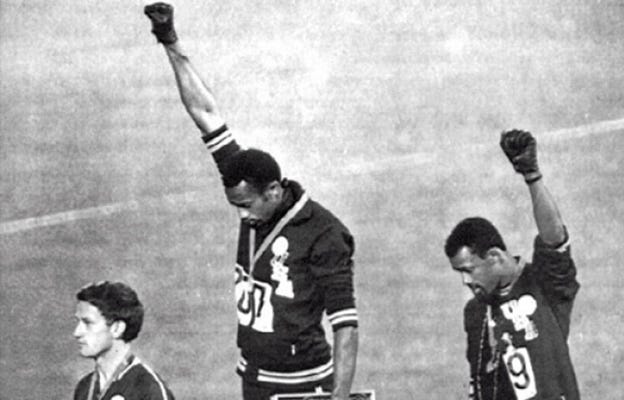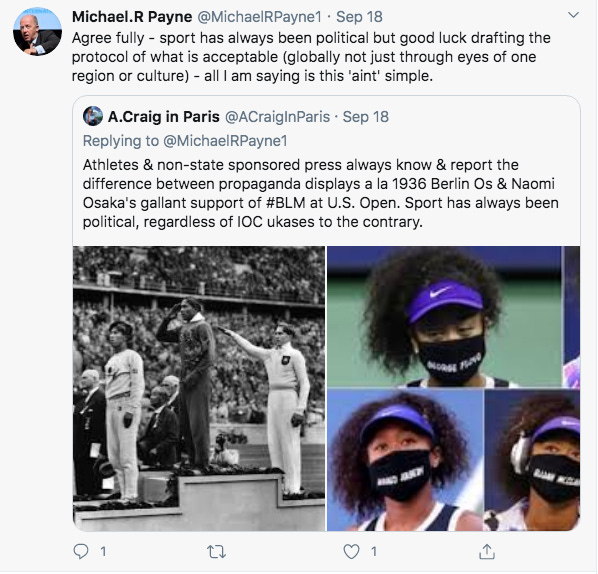The medal podium: Where politics and marketing collide
There’s going to be a collision in Tokyo next year. One the one side, the momentum of the athlete-as-activist trend seems unstoppable. Standing in its way is an equally obdurate force, IOC bureaucracy.
(Listen to this week’s podcast with Timo Lumme, the IOC head of broadcast and marketing that goes in to depth on this issue).

Fifty years after that iconic moment at the 1968 Games, Tommie Smith’s Black Power salute fronted a Puma brand purpose campaign.

And next year in Tokyo, there will be many, many athletes seeking their own Tommie Smith moment. Seb Coe says its ok.

Michael Payne, the former IOC head of marketing and broadcast, is less sure.


The podium is where athlete activism, personal brand, TOP sponsorship values and the brand purpose trends conflict with the IOC’s regulation and desire for control. This applies specifically to Rules 40 and 50.
Rule 40 of the Olympic Charter states: “Except as permitted by the *IOC* Executive Board, no competitor, coach, trainer or official who participates in the Olympic Games may allow his person, name, picture or sports performances to be used for advertising purposes during the Olympic Games.”
Rule 50*of the*Olympic Charter states: “No kind of demonstration or political, religious or racial propaganda is permitted in any Olympic sites, venues or other areas.”
Timo Lumme replaced Michael Payne at the IOC in 2004 as the IOC’s sponsor and TV person. He articulated the IOC position in this week’s podcast and it’s fair to say that I’m genuinely confused as to where I stand.
The two rules are distinct in their aim - but athlete activism combined with the broader rise of sponsors pursuing brand purpose strategies mean Rules 40 and 50 are now entwined.
Rule 40 is a counter balance to the rise of the personal brand, a device that limits the ability of a small number of superstars to undermine the IOC business model for the whole of the athlete community - if a brand can build an association with the Olympics via a few athlete deals, why would it pay millions to partner locally or globally at a vastly higher price point? (Noting that this money goes back to the NOCs and ultimately the athletes - all of them, not just the famous ones).
Athletes, and their agencies, have a route to the media, and can easily be positioned as the little guys against the tediously bureaucratic Olympic governing body. It makes a good story, because after all, who wants to be on the side of the IOC against Adam Gemili, Katarina Johnson Thompson and Laura Muir ffs?

But.
Given the vogue for brand purpose, it’s very clear that the strategy whiteboards of every athlete sponsor and shoe maker will seek to use cause as the creative engine for their commercial support. Some of these campaigns will be done in good faith and arise from long term commitment from the companies involved, while others will be just cynical marketing bollocks. So what is a political statement and what is a marketing campaign, and does it matter if the Games become the focal point of this question? Whose politics are ok as a podium cause, and whose aren’t? Looks like we’re in poppy territory.

What They Don’t Teach You At Sports Business School* (aka how do you become the next IOC head of broadcast and marketing?)
It’s sometimes said that Timo Lumme has had the perfect sports business career. I’d be interested in what the CV of his successor will need to demonstrate.
In 1988, Timo Lumme joined International Management Group (IMG) as Associate Counsel for IMG’s sports clients, moving to France in 1989 to head up IMG’s team within COJO (Comite d’Organisation des Jeux Olympiques) with responsibility for the international marketing of the 1992 Albertville Games. Lumme also managed the group’s commercial consultancy relationship with the 1994 Lillehammer Olympic Winter Games.
In 1992, he was promoted to Managing Director for IMG Italy with responsibility for all client, event and television activities. In 1994, Lumme returned to the UK as Vice President of Business Development, jointly spearheading IMG’s entry into the football business. In 1996, he joined Nike as European Sports Marketing Director, responsible for Nike’s Sports marketing strategy, management and execution in Europe. He joined Quokka Sports Ltd in 1999 as Managing Director, Europe.
Lumme is a qualified solicitor and is fluent in five languages.
Responsible for the sale of all broadcast rights to the Olympic Games, the negotiation and sale of Worldwide Olympic Partnerships as well as the management of the IOC’s global sponsorship programme known as TOP. His responsibilities include the development and implementation of the IOC’s strategic marketing plan and oversight of Olympic marketing programmes worldwide.
Timo joined the IOC in 2004 from ESPN where he worked as Vice President Europe, Middle East and Africa (EMEA) since 2001. He combines a strong background in the worlds of marketing and broadcast with Olympic Games experience. He started his career in 1988 with the International Management Group (IMG) where he held marketing and management positions in London, Paris and Milan. Specific Olympic Games work includes the 1992 Albertville and 1994 Lillehammer Olympic Winter Games.
Other achievements include three years at Nike as European Sports Marketing Director, negotiating and overseeing commercial sponsorship arrangements with over 1,000 athletes, teams, events and federations. He also worked in new media for Quokka Sports, including as general manager for nbcolympics.com, complementing NBC’s coverage of the Sydney 2000 and Salt Lake City 2002 Olympic Games.
* Apologies to Mark McCormack.

Now, why not do us a favour
Subscribe to the UP podcast.
Sign up to this newsletter and tell your mates, particularly the rich ones.
Follow @RichardGillis1 and @PaulPingles (aka the ill-judged Twitter handle of Sean Singleton, the UP co-founder).
Leave gushing five star reviews on Apple Podcasts - click the image.

